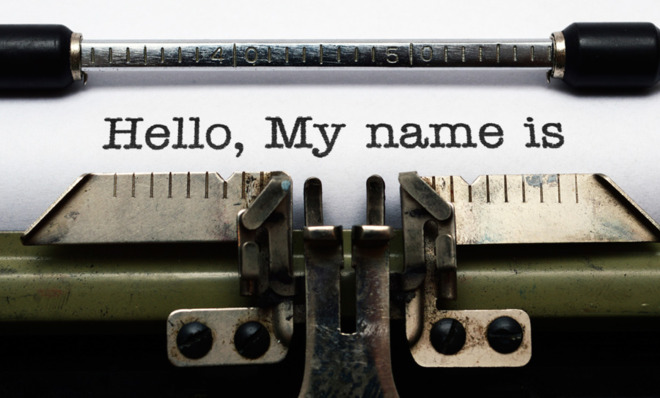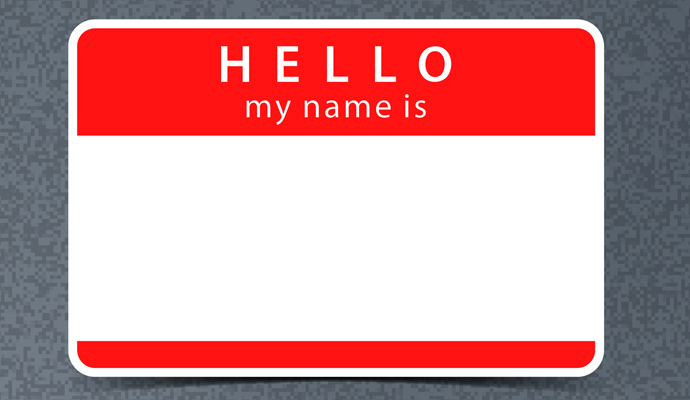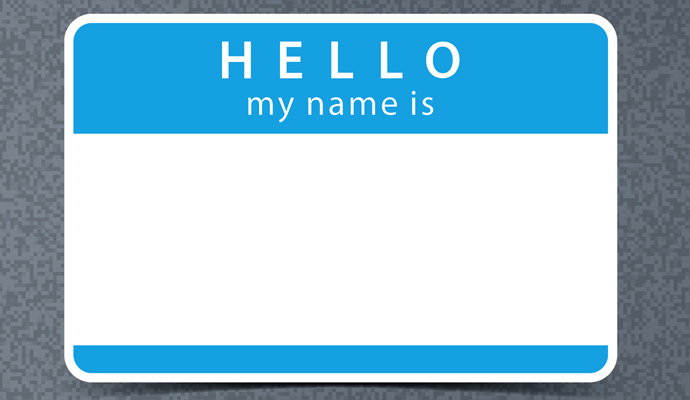Life with an unpronounceable name
Just try it: Ekpedeme Bassey. Mairéad O'Grady. Niti Suchdeve.

A free daily email with the biggest news stories of the day – and the best features from TheWeek.com
You are now subscribed
Your newsletter sign-up was successful

"My name strikes fear in the hearts of many when they first see it."
So says Ekpedeme Bassey, who was born in the U.S. to Nigerian parents and given a traditional Nigerian name. "I don't have an earliest memory of my name being mispronounced. My name was always mispronounced."
Since she was young, Ekpedeme (pronounced Ek-peh-deh-may) sometimes mysteriously becomes "Experdeem" or even "Expedermis." More often, people are just plain stumped. While Bassey retains a sense of humor about it, she admits her lightheartedness can give way to frustration.
The Week
Escape your echo chamber. Get the facts behind the news, plus analysis from multiple perspectives.

Sign up for The Week's Free Newsletters
From our morning news briefing to a weekly Good News Newsletter, get the best of The Week delivered directly to your inbox.
From our morning news briefing to a weekly Good News Newsletter, get the best of The Week delivered directly to your inbox.
"I always longed for an easier name, like Lisa," says Bassey, who spent her school years in predominantly Caucasian environments in New York City and Atlanta. Bassey briefly tried going by her middle name, "Mfon," which she figured would be easier. When that evolved into "Muffin" or even "Blackberry Muffin," for the color of her skin, she retired it.
Even her own mother struggled to pronounce "Ekpedeme," as she came from a different ethnic tribe than Bassey's father, who chose her name. She gave her the nickname "Pamay," which opened up its own problems: people who call her "Pam," not realizing Pamay is already a nickname.
Bassey's memories provide a snapshot of the experience of being the kid with the "unusual" name, and most in a position like hers have a story. Niti Suchdeve was "Lucy" for a year to a social studies teacher who wanted to avoid the awkwardness of mispronouncing her name. Mairéad O'Grady learned to say "here" during elementary school roll call based on the long pause after another student's name. And after cycling through such odd derivations as "Fez" and even "Coleslaw," Oljas Toleu eventually adopted the nickname "OJ" — the first and third letter of his first name, and the only ones most people seemed able to pronounce together — but would also settle for "Jim" or "Josh."
(More from Narratively: Allergic to America)
A free daily email with the biggest news stories of the day – and the best features from TheWeek.com
While occasionally a name that's difficult to pronounce may spellbind the public and dominate media coverage, as it happened when a young Quvenzhané (kwuh-VEN-zhuh-nay) Wallis was nominated for an Oscar for her performance in Beasts of the Southern Wild, for many, having one is just business as usual. Growing up with a name others find burdensome can be more than just an occasionally comedic, teaching moment. Sometimes, it can influence everything from your personality to the kind of job you have.
Names are inextricably bound up with personal identity and sense of self. They may not be something you spend much time ruminating on, unless yours has been regularly garbled, but experts in the fields of psychology, neurology, and sociology agree there's a lot to a name.
"Unpronounceables" learn to adapt to a tongue-tied world.

Pediatric development researchers Dennis P. Carmody and Michael Lewis reported in "Brain Research" in 2006 that hearing your own name has "unique brain functioning activation specific to [it] in relation to the names of others." Hearing your name triggers a physiological response — it's comforting, it draws your attention and generates the the so-called Cocktail Party Effect, or "selective attention," which enables people to segregate their own names, for instance, among other various auditory stimuli. Your name is yours and yours alone. Others may share it, but what it means to you is unique on many levels of personal identification and association.
Your name could also, potentially, impact the outcome of your life.
A study published in the Journal of Experimental Social Psychology in 2011 titled "Why People Like Mr. Smith More Than Mr. Colquhoun," found there are certain advantages to going through life with an "easier" name. The study, led by Dr. Simon M. Laham, demonstrated that people are more inclined to "form positive impressions of easy-to-pronounce names." For instance, lawyers with more conventionally pronounceable names were more likely to rise to higher positions in their firm's hierarchy.
(More from Narratively: Green grass and guns)
"I remember my name being mispronounced from an early age," says Mairéad (Ma-ray-id) Siobhán (Sha-von) O'Grady, born in the U.S. to parents of Irish descent who wanted to give their three daughters characteristically Irish names as a way to adhere to their roots, even if they were "unpronounceable and non-phonetic."
O'Grady grew up in Milton, Massachusetts, the most Irish-Catholic town in America, although her early schooling did not reflect that statistic. Her elementary school was more than 50 percent non-white, she says, and students had many different types of names.
"The first day, or even week, of school would be a continuous lesson in my name — and every time we had a substitute teacher, forget about it," recalls O'Grady. "Most mispronunciations are something along the lines of May-Reed, Marry-Ed, My-Red." Sometimes, however, they're a little more out there. "My elementary school's computer system couldn't account for the accent mark on the 'e'," says O'Grady. "My name became 'Mairhead.'"
For many kids socializing and interacting with the broader outside world for the first time, school is the epicenter of their lives, where they grow and form an identity, the basis of which lasts their whole lives. It's where they learn about cultural sensitivity and self-respect. It's where the idea of the self in relation to the community begins to take shape.
"Identity formation is a social endeavor," says Christine Patton, a postdoctoral research associate at the Society for Research on Adolescence. "Teens use the cues and feedback of others around them to understand who they are and who they might become."
But this process, we must assume, starts taking shape a good deal earlier than adolescence. Disregarding the pronunciation of a student's name may not seem as grave an offense as discrimination based on the color of a student's skin or religion, but it can equate to turning a blind eye to diversity, thereby perpetuating the cycle of marginalization. As a child, it can be daunting to participate in a classroom where your name is continually mispronounced with little regard for accuracy.
O'Grady has always corrected those who mispronounce her name, as she considers it an important part of her identity, even though she does not otherwise maintain a strong bond to the Irish community. "If it's not being said right, I just can't listen to it," she says.
As O'Grady notes, and Laham's study proves, a name that's not yours does not affect you in the same affirming, physiological
way. A blasé mispronunciation may be taken as a slight or signify a lack of respect.

In the eighth grade, 'Niti' (Nee-thee) Suchdeve (Such-deev), had a teacher who was unresponsive to the repeated corrections of her mispronunciations, continuing to bungle her name for a full year. "It made me feel insecure about my work. I felt that she liked the other kids, the white kids, better," says Suchdeve.
Growing up in the primarily white, upper-middle class town of Babylon, Long Island, Suchdeve, who immigrated to the U.S. from South Asia at the age of three-and-a-half, felt uncomfortable correcting the mispronunciations, eventually settling on letting people call her "Nee-Tee," which seemed a little easier. Ironically, she was actually born with the name "Devyanka," but her mother, concerned Americans would not be able to pronounce it, renamed her after her best friend, Niti — a simpler, yet apparently not simple enough name.
Laham says he hopes his research on name discrimination will force people to examine their biases when it comes to hearing an unfamiliar name: it's a process, conscious or not, insinuating that one's own cultural background is a focal point to which the unfamiliar is always the other.
(More from Narratively: The Nuyorican revolution)
Imagine, then, the intimidation an American teacher might instill in a young child from another country — imagine the courage needed to stand up for herself, and to repeatedly do so when she is ignored and that courage is rebuffed. It's often easier for a child to try to assimilate whose "unusual" name is coupled with a different country of origin, a different racial background or a distinct accent.
Ultimately, it's not as simple as merely taking the time to learn each student's name. This process is complicated by behaviors and human barriers on the part of both students and teachers, even well-meaning ones. Students may be too intimidated to speak up or simply not care. Educators may be overwhelmed, forgetful or even affected by learning disabilities, which can make it hard to keep track of numerous names.
So what can educators do? Pamela Kelly, who for three years taught in an inner city school in Memphis, Tennessee, that had children with "unique first names" but more conventional surnames, offers one possible solution. "I called my students 'Scholar (insert last name).' It made the children feel smart, and I respected their unique names without engaging in wasted conversation or ridicule."
Read the rest of this story at Narratively.
Narratively is an online magazine devoted to original, in-depth and untold stories. Each week, Narratively explores a different theme and publishes just one story a day. It was one of TIME's 50 Best Websites of 2013.
-
 Crisis in Cuba: a ‘golden opportunity’ for Washington?
Crisis in Cuba: a ‘golden opportunity’ for Washington?Talking Point The Trump administration is applying the pressure, and with Latin America swinging to the right, Havana is becoming more ‘politically isolated’
-
 5 thoroughly redacted cartoons about Pam Bondi protecting predators
5 thoroughly redacted cartoons about Pam Bondi protecting predatorsCartoons Artists take on the real victim, types of protection, and more
-
 Palestine Action and the trouble with defining terrorism
Palestine Action and the trouble with defining terrorismIn the Spotlight The issues with proscribing the group ‘became apparent as soon as the police began putting it into practice’